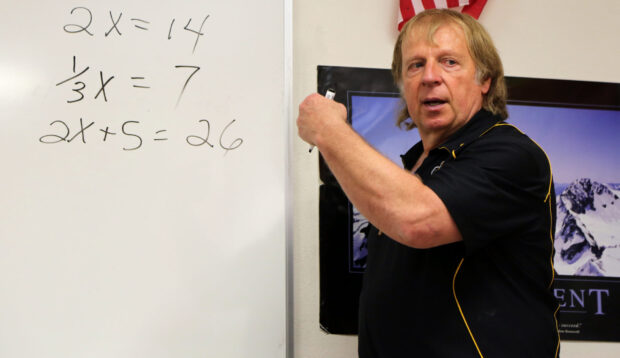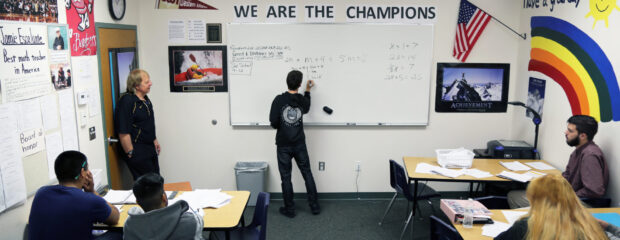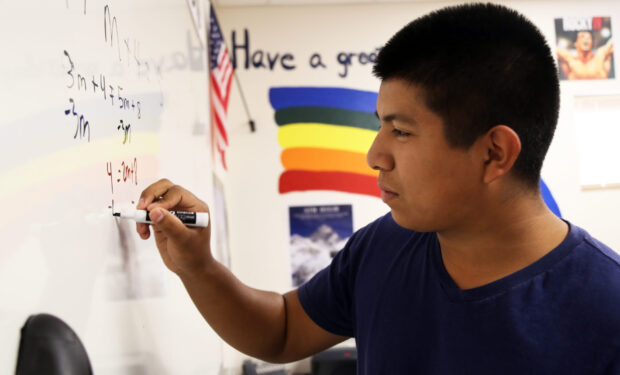CALDWELL — If you miss one assignment in DuWayne Krause’s math class you will fail. Your assignment must be at least 70 percent completed or it does not count. No exceptions.
Under those expectations, nearly 95 percent of Krause’s students have passed his math classes in the past two years.
“I am probably the toughest teacher my students have ever had,” said Krause, a math teacher at Vallivue Academy, an alternative high school in the Vallivue School District.
Krause created a learning model for the way he teaches math and it is grounded in data and research.
What’s his secret?
Krause believes the most common reasons for failure in school is lack of discipline and an inability or refusal to follow directions. Therefore, he breaks down content so it’s more digestible. Anything that is distracting, is unacceptable in his classroom.
“I make the choice theirs,” he said. “They either meet my expectations or they won’t be in my classroom.”
An average student who enrolls at Vallivue Academy is a junior and scores at a sixth-grade level on a math assessment that is given at the start of each quarter.
Students take a principles of math course with Krause, which is learning basic arithmetic — add, subtract, multiply and divide. As students master math fundamentals, they move onto higher levels of math each quarter.
“Starting out on a low skill level class students are successful and they start believing they can do math successfully,” Krause said.
Students are not allowed to use calculators and must use their brains to solve problems.
“When calculators are taken away from students, you will see an immediate improvement,” Krause said.
Krause teaches memory enhancing techniques that he learned through his research. Krause has read more than 30 books about business education and classroom management. He studies how countries like Finland, Poland and Singapore teach math.
“Other countries make a conscious effort while teaching because they recognized what’s working and not working,” he said.
Students interact together during class by solving math problems on the whiteboard and conducting peer review. If a student solves a problem wrong in front of the class, Krause turns it into a learning opportunity.
“My kids learn that wrong answers are not the end of the world, it just means that we have to try another way,” Krause said. “My kids are never put down for wrong answers by me, nor do I let any other student put them down.”
Expectations are set high in Krause classroom:
- All assignments must be completed at 70 percent or higher. Students must correct all work until it reaches that level.
- All assignments must be turned in or students will fail the class.
- If a student is caught cheating, they fail the class.
“Students quickly figure out that they might as well put the effort into getting assignments right the first time rather than do them over,” Krause said.
He works with students before school, at lunch and at the end of the day. Krause runs a Saturday math class from 9 a.m. until noon every quarter. It’s to get students caught up who are on the brink of falling behind in his classes. On average nine students will attend each Saturday.
“I give students no excuses not to put in the effort,” Krause said.
The data
Krause crunches numbers each quarter to look at success and failure. He gives a math assessment at the start of each quarter and gives the same assessment at the end of the quarter.
A look at the 2016-17 school year numbers:
- First quarter: All 52 students passed (100 percent pass rate.)
- Second quarter: 60 students passed (3 failed, 97 percent pass rate.)
- Third quarter: 51 students passed (5 failed, 90 percent pass rate.)
- Fourth quarter: 50 students passed (4 failed, 94 percent pass rate.)
“The numbers show my method is working,” he said. “I take data very seriously.”
Krause said his teaching model works in all classroom environments. He used the same techniques while teaching at a Twin Falls charter school with 30 students.
“Krause has adjusted curriculum to match the kind of math applications taking place in the working world, said Mark Layne, the principal at Vallivue Academy. “He’s fixing the fundamental math piece kids are missing.”
Student experience
When Elian Lopez entered Krause’s math class last year he could only add, subtract, multiply and divide.
The 17-year-old struggled with the fundamentals of math. Before attending Vallivue Academy, he was enrolled at Ridgevue High School. He had only earned one math credit and it was in geometry. Elian is now enrolled in algebra and has earned three math credits since attending Vallivue Academy.
“I don’t know how I ended up in geometry, I kind of got pushed through,” Elian said. “I have learned more in a year than I ever did throughout high school. I understand math much better and I feel motivated in class.”
Elian is on track to graduate in May and plans to go into the Air National Guard.



